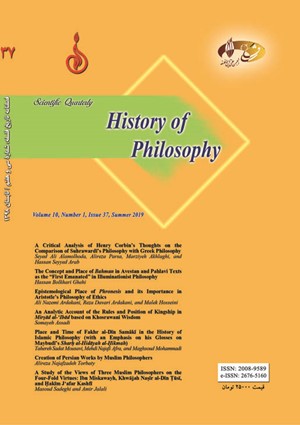A Study of the Views of Three Muslim Philosophers on the Four-Fold Virtues: Ibn Miskawayh, Khwājah Naṣīr al-Dīn Ṭūsī, and Ḥakīm J‘afar Kashfī
Subject Areas : Etymology of philosophical termsMasoud Sadeghi 1 , amir jalali 2
1 -
2 -
Keywords: Wisdom bravery piety justice Ibn Miskawayh Khwājah Naṣīr al-Dīn Ṭūsī Ḥakīm J‘afar Kashfī,
Abstract :
Ibn Miskawayh, Khwājah Naṣīr al-Dīn Ṭūsī, and Ḥakīm J‘afar Kashfī share relatively similar views on the soul and believe in Aristotle’s middle term. Moreover, all of them consider the four-fold virtues of wisdom, bravery, piety, and justice to be the most original moral virtues; however, they also have some disagreements with each other. This paper, while trying to accurately explain the similarities between them, aims to carefully investigate the differences among them regarding the mentioned virtues. Accordingly, after dividing the virtues into primary and secondary ones, the authors analyze and compare the lists and definitions of secondary virtues in the view of each of these philosophers with those of others. The findings of this study demonstrate that the greatest similarities between the views of Ibn Miskawayh, Khwājah Naṣīr al-Dīn Ṭūsī, and Ḥakīm J‘afar Kashfī pertain to the virtue of wisdom and its related virtues. However, there are some relatively noteworthy differences among them regarding bravery, piety, and justice. For example, regarding piety, there is some disagreement between the views of Ibn Miskawayh and Ṭūsī; nevertheless, Ḥakīm Kashfī provides a different list of secondary virtues in comparison to the other two philosophers and oftentimes discusses piety in unity with economic and sexual self-discipline. The list and definitions of secondary virtues in relation to justice are completely similar to each other in the views of Khwājah Naṣīr al-Dīn Ṭūsī and Kashfī; however, Ibn Miskawayh’s list of justice-related secondary virtues contains 13 items more than those of the other two philosophers.
قرآن کریم. ابنمسکویه، ابوعلی (بیتا) تهذیب الاخلاق و تطهیر الاعراق، تحقیق و شرح ابنالخطیب، قاهره: مکتبة الثقافه الدینیه، چ1.
ابنمسکویه، ابوعلی (1369) اخلاق و راه سعادت: اقتباس و ترجمه از طهارهالاعراق ابنمسكويه، ترجمه و اقتباس نصرت بیگم امین، تهران: نشر فیض کاشانی.
طوسي، نصیرالدین محمد بن محمد (1380) بازنگاری اساسالاقتباس، بکوشش مصطفی بروجردی، تهران: وزارت فرهنگ و ارشاد اسلامی.
طوسي، نصیرالدین محمد بن محمد (1413ق) اخلاق ناصری، تهران: علمیه اسلامیه.
کشفی، جعفر بن ابی اسحاق (1381) تحفةالملوک: گفتارهایی دربارة حکمت سیاسی، ج2، بکوشش عبدالوهاب فراتی، قم: بوستان کتاب.
مطهری، مرتضی (1381) کلیات علوم اسلامی، ج1، قم: صدرا.
Aristotle (2004). Nicomachean Ethics. R. Crisp, (Trans. and Ed.) Cambridge: Cambridge University Press.
David, T. (1999). Young children learning. SAGE.
Gledhill, A. (2007). BTEC national sport and exercise science student book. Heinemann.
Malone, S. A. (2003). Learning about learning. London: CIPD Publishing.


